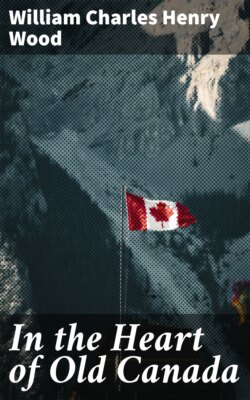Читать книгу In the Heart of Old Canada - William Charles Henry Wood - Страница 15
На сайте Литреса книга снята с продажи.
III
ОглавлениеThere's the call of the blood—of the best of our living, pulsing, quickening blood to-day—a call to every French and English ear—from this one ground alone:—and therefore an irresistible appeal from all the Battlefields together. The cause of strife is long since outworn and cast aside: only its chivalry remains. The meaner passions, jealousies and schemes arose and flourished most in courts, and parliaments, and mobs, of different countries, far asunder. But the finer essence of the fatherlands was in the men who actually met in arms. And here, now and forever, are the field, the memory and the inspiration of all that is most heroic in the contending races.
From Champlain to Carleton, in many troublous times during 167 years, Quebec was the scene of fateful action for Iroquois and Huron; for French of every quarter, from Normandy and Brittany to Languedoc and Roussillon; for French-Canadians of the whole long waterway from the Lakes and Mississippi to the St. Lawrence and Atlantic; for Americans from their thirteen colonies; for all the kindred of the British Isles—English, Irish, Scotch and Welsh, Channel Islanders and Orcadians; and for Newfoundlanders, the first Anglo-Canadians, and the forerunners of the United Empire Loyalists.
Champlain, in 1608, first built his Abitacion against the menace of the wilderness. In 1629 the Kirkes sailed up and took his Fort St. Louis in the name of Charles I, who granted the unconsidered trifle of "The Lordship and County of Canada" to his good friend, Sir William Alexander, Baronet of Nova Scotia! But in 1690 the summons of Sir William Phips was victoriously answered by Frontenac—from the mouth of my cannon. In 1759 Montcalm won his fourth victory by repulsing Wolfe at Montmorency: then both died on the Plains, where Lévis and Murray fought again next year. Finally, on the last day of 1775, French and English first stood together as the British defence of Canada, under Carleton, against the Americans under Montgomery and Arnold. This is our true wonder-tale of war; and we have nothing to fear from the truth.
Is it to be thought of that we should fail to dedicate what our forefathers have so consecrated as the one field of glory common to us all? There is no question of barring modern progress—the energy for which we inherit from these very ancestors; and no town should ever be made a mere "show place," devoted to the pettier kinds of touristry and dilettante antiquarian delights. But Quebec has room to set aside the most typical spots for commemoration; and this on the sound business principle of putting every site to its most efficient use. So there remains nothing beyond the time and trouble and expense of making what will become The Quebec Battlefields Park. This will include the best of the Plains of Abraham, and the best of every other centre of action that can be preserved in whole, or part, or only in souvenir by means of a tablet. Appropriate places within these limits could be chosen to commemorate the names of eleven historic characters: Champlain, who founded Canada; Montcalm, Wolfe, Lévis, Murray, Saunders and Vauquelin, who fought for her; Cook and Bougainville, the circumnavigators, who did her yeoman service; and Frontenac and Carleton, who saved her, in different ways, to the same end, and from the common enemy.
But no historic sites will be obscured, much less obliterated; and no incongruous features of a park will mar the appeal which the battlefields make to the historic imagination. One distinctive name is required to include the Plains and every other great war-landmark round Quebec. Wolfe's quarters were seven miles below the Plains, the point where Vauquelin made his last stand is twenty miles above. What other single name could cover all three except The Quebec Battlefields, which is both self-explaining and unique? The word Park is a mere official designation of an administrative entity: it will never live in history or literature or everyday talk. And The Plains of Abraham will no more lose their name and identity in a Battlefields Park than Quebec has lost either name or identity in the Dominion of Canada. Instead, their identity will regain its full extent, which will be an open book for all who come to read the story of their hero-making fights. And, as for their own familiar name—that, being immortal, can never suffer change.
High above all, on a calm central summit of this field of double victory and fourfold glory, the Angel of Peace will stand in benediction of the scene. In her blest presence we heirs of a fame told round the world in French and English speech can dwell upon a bounteous view that has long forgotten the strange, grim face of war. But remember!...the statue will rest upon a field of battle; and our own peace rests on ancestral prowess. The very ground reminds us of supreme ordeals. And though, in mere size, it is no more, to the whole vast bulk of Canada, than the flag is to a man-of-war, yet, like the flag, it is the sign and symbol of a people's soul.
